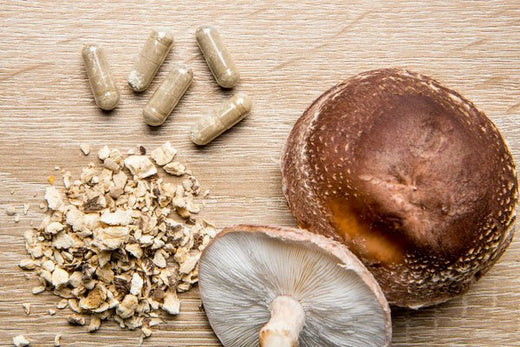What You Need to Know About the Mushroom Nutrition

An Overview
Welcome to the world of medicinal mushrooms!
There is a worldwide underground market for medicinal mushrooms, which is one of the world's best-kept superfood secrets. Their great variety of health advantages and nutritional value is continually rising in popularity and is the subject of much discussion.
In terms of the HPA axis, the neuronal connection between the brain, the senses, and the adrenal glands, medicinal mushrooms are mostly adaptogens, which are exceptional herbs that regulate the body's stress response.
The use of medicinal mushrooms can help one return to a state of equilibrium and homeostasis in both mind and body. On top of that, they are anti-inflammatory, antioxidant, and enhance longevity.
Mushrooms, because of their rich vitamin and macronutrient content, are a healthy supplement to your regular meals and snacks.
Mushrooms are an excellent source of protein and amino acids, which are used by our bodies to construct tissues such as muscle, skin, and gut lining. Vitamin D and important minerals like phosphorus and selenium are present, as are the unusual carbohydrate molecules chitin and beta-glucans.
These basic nutritional characteristics and attributes are shared by all mushroom species and cultivars, notwithstanding some differences in the nutritional profile between them.
If you're interested in learning more about the nutritional benefits of mushrooms and other great ways to eat healthy, keep reading!
Table of Contents
-
A Complete Guide
-
Nutritional Value Overview
-
Protein
-
Carbohydrates
-
Fat
-
Information Of Calorie
-
Vitamins and Minerals
-
B Vitamins
-
Folate
-
Vitamin D
-
Selenium
-
Copper
-
Phosphorus
-
Potassium
-
Vitamin B12
-
How Mushrooms Boost the Body's Health
-
Antioxidants
-
Cholesterol and Blood Pressure
-
Healthy Gut
-
Weight Control
-
Skin Health is Improved
-
Frequently Asked Questions
-
Are mushrooms good for you?
-
How many calories in mushrooms?
-
How many carbs in mushrooms?
-
How much protein in mushrooms?
-
Are mushrooms high in iron?
-
To summarize
-
References

A Complete Guide
This article will focus on the nutritional value of mushrooms and answer questions like:
How many calories do mushrooms have?
Does protein exist in mushrooms?
In terms of carbs, how many calories do mushrooms have? together with some more helpful advice on diet.
We'll break down the vitamins and nutrients that mushrooms are particularly rich in and explain why they're so healthy. You'll learn everything there is to know about the nutritional advantages of mushrooms and have access to top-notch health advice as a result.
Nutritional Value Overview
Protein
Mushrooms provide a significant amount of protein, making them a valuable source of this essential nutrient.
While many people associate protein with typical sources like chicken, beef, eggs, and tofu, it is actually present in all the foods we consume, including mushrooms.
Protein plays a crucial role as a building block in our bodies, contributing to various functions. It helps create enzymes that facilitate chemical reactions, and it is responsible for the formation of important components such as hemoglobin, immunoglobulins, antibodies, collagen, elastin, heart muscle, red blood cells, gut lining, and the immune system.
An interesting aspect of mushroom nutrition is the presence of unique proteins known as hydrophobins. These surface-active proteins have the ability to bind to amphoteric membranes, allowing mushrooms to establish connections among their hyphae networks beneath the ground and communicate with their environment.
Furthermore, the protein compounds found in mushrooms contribute to their distinctive "meaty" flavor and texture.
Medicinal mushrooms like Reishi, Chaga, and Cordyceps are particularly noteworthy for their nutritional content. They claim to provide approximately 6-12 grams of protein per 100-gram serving, making them a valuable addition to your daily protein intake. In addition to protein, these mushrooms offer a wide range of health benefits due to their unique beta-glucans and antioxidant compounds.
Culinary mushrooms such as shiitake mushrooms, oyster mushrooms, and white button mushrooms contain about 4-9 grams of protein per 100-gram serving and offer a more conventional nutritional profile.
The nutritional information of medicinal mushrooms reveals that they are especially rich in key amino acids such as alanine, aspartic acid, and glutamic acid.
Alanine plays a role in maintaining and supporting the central nervous system, muscle contraction, and immune regulation. Aspartic acid is involved in the production of sex hormones, supporting fertility, and maintaining central nervous system function.
Glutamic acid contributes to the creation of glutamate, a crucial excitatory neurotransmitter that supports cognitive functions like learning and memory.
These essential amino acids significantly enhance the medicinal and nutritional value of mushrooms, providing numerous health benefits.
Carbohydrates
The nutritional composition of mushrooms indicates that they do not contain carbohydrates.
Instead, they are abundant in specific starches and beta-glucans that have positive effects on the gut, immune system, cholesterol levels, blood sugar regulation, and weight loss efforts.
Carbohydrates can be categorized as monosaccharides, disaccharides, or polysaccharides based on the number of carbon chains they possess.
Looking beyond the biochemistry aspect, mushrooms contain polysaccharides called beta-glucans, which exhibit immunomodulatory, anti-tumor, and anti-inflammatory properties.
According to the nutritional information available, each mushroom variety contains a variety of unique polysaccharides. This is particularly fascinating because our immune system's cell membranes have specific receptors designed to interact with these fungal polysaccharides.
It's as if our bodies are naturally inclined to consume mushrooms.
The starches found in mushrooms are not the same as those found in foods like sweet potatoes or brown rice, and they do not have any caloric impact.
Instead, these beta-glucan compounds effectively communicate with our immune system, promoting a healthy immune response.
This is particularly beneficial for individuals with insulin resistance and type-2 diabetes, as mushrooms have no impact on blood glucose levels.
Specifically, the Maitake mushroom contains a beta-glucan known as D-fraction, which has been shown to improve glucose tolerance, enhance uptake, and help stabilize blood sugar levels.
Chitin is another type of starch that forms the mycelium and cell walls of mushrooms, contributing to their unique texture and shapes. Chitin stimulates both innate and adaptive immune responses and offers antibacterial and antioxidant benefits, thereby improving overall health.
Furthermore, the nutritional information reveals that mushrooms have no carbohydrate content.
They contribute to better blood sugar control, cholesterol management, immune system support, weight loss, and hormone balance, and serve as a unique source of dietary fiber, which promotes healthy cholesterol levels, liver detoxification, gut health, and overall nutrition.
Fat
Mushrooms contain very little fat, with the majority of their lipids being contained in the cell walls.
Shiitake mushrooms contain fatty acid-soluble vitamins, like Vitamin D, which have no calories.
The nutritional information indicates that superfoods and mushrooms are not particularly high in macronutrients. Instead, they are full of the micronutrients our bodies need to function at their best, such as vitamins, minerals, and enzymes.
Choline, a crucial B vitamin involved in the synthesis, metabolism, and transit of lipids in the body, is also abundant in culinary mushrooms.
In order to maintain a healthy nervous system, support healthy brain function, facilitate cell signaling, and support general nervous system function, choline plays a particularly significant role. This makes eating mushrooms a great option for increasing choline consumption and reaping the rewards in terms of better health.
Information Of Calorie
As members of the fungus kingdom, mushrooms have a special quality.
They are not considered to be either plants or animals, thus when compared to other plant-based foods, their biochemical composition and nutrient density are genuinely amazing.
According to nutritional information, mushrooms have few calories, making them a calorie-contributing food option.
Despite having little effect on calorie intake or blood sugar levels, mushrooms are exceptionally nutrient-dense, offering vital amino acids, dietary fiber, and a wide variety of minerals and vitamins.
This makes mushrooms a great choice for anyone who is concerned about losing weight, has high cholesterol or blood sugar, watches their calorie intake, or pays attention to glycemic index numbers.
Additionally, adding mushrooms to your diet can help you improve your general health, bolster your immune system, and strengthen your neurological system.
Vitamins and Minerals
B Vitamins
According to the available information, the B vitamins are a class of water-soluble vitamins that include Thiamin, Riboflavin, Niacin, Pantothenic Acid, Pyridoxine, Folate, and Cobalamin, as well as Biotin often.
B vitamins are essential to our general health since they are engaged in many different facets of our well-being. They play a crucial role in every biological activity, including the creation of energy, the utilization of macronutrients, muscle contraction, and detoxification.
Taking B vitamins provides a number of important advantages, including:
- Promoting mitochondrial function to increase energy levels.
- Supporting the detoxification process.
- Aiding in the hormonal regulation of sex.
- Assisting thyroid hormone conversion.
- Encouraging the contraction and recuperation of muscles.
- Improving mental function and cognition.
- Helping to regulate mood and the production of neurotransmitters.
- Supporting the neurological system and reducing the impact of stress.
- Promoting skin health.
- Enabling cell division and replication.
- Promoting the metabolism of proteins.
- Supporting heart health and normal iron levels.
- Encouraging healthy conception and reproduction.
According to my personal experience, it is best to receive B vitamins largely from whole food sources because they offer the bioavailable form that our bodies are used to consuming.
Additionally, activated B vitamins are advised when contemplating supplementation as they have already been "methylated" and are easily assimilated by the body.
Consuming mushrooms high in B vitamins might be a great nutritional source to increase energy for people who are feeling down.
Folate
Although folate is frequently linked to conception and fertility, it has more uses than just being a vitamin for expecting mothers.
The B vitamin folate, often known as vitamin B9, is necessary for DNA replication and gene expression. It maintains healthy iron levels and consumption while assisting in liver detoxification.
Folate aids in cell division and the production of dopamine and serotonin, two neurotransmitters that improve mood.
Portobello, button, oyster, and shiitake mushrooms are all good sources of folate because they contain about 22 mcg of it per 100 g of food.
For non-pregnant adults, the recommended daily intake (RDI) is 400 mcg, whereas pregnant women need 1000 mcg daily. Mushrooms can therefore be used as a further whole food source of folate.
It's crucial to make a distinction between folate and folic acid when talking about the nutritional facts of folate.
The synthetic form of folate, known as folic acid, is frequently included in B vitamin and pregnancy supplements. It is not as bioavailable as 5-methyltetrahydrofolate (5-MTHF), the active form of folate. This differentiation is especially important for those whose bodies struggle with correct methylation, which can lead to disease development and a variety of symptoms. These people have the MTHFR gene polymorphism.
Since complete foods naturally include methyl donors that enable gene control, avoiding tumor growth, premature cell death, and inflammation, it is ideal to receive folate from these sources.
In addition, folate is an essential vitamin for conception, fertility, and pregnancy. It should be taken in greater doses to promote the quick cell division necessary for the creation of life as well as to keep the mother's iron levels, energy, and overall health stable.
The function of folate in the body, as well as its advantages, include:
- Promoting the division of cells and the production of new cells.
- Helping the liver to detoxify.
- Encouraging DNA replication and gene expression.
- Supporting the control of mood.
- Keeping iron levels in a healthy range.
- Boosting one's energy.
- Engaging in the homocysteine/SAMe cycle to reduce inflammation.
In conclusion, B vitamins are critical for overall health, as they play a significant part in hormone balance, energy production, metabolism, detoxification, and several physiological activities. It is advised to get your B vitamins from whole foods; however, when supplementing, activated forms are preferable.
The benefits of the B vitamin folate extend beyond its connection to conception and pregnancy. Gene expression, DNA replication, liver detoxification, and mood control are all affected by it. Consuming folate from whole food sources, like mushrooms, is advantageous for cell division, the development of neurotransmitters, the usage of iron, the production of energy, and the decrease of inflammation. Especially for people with the MTHFR gene polymorphism, it's critical to distinguish between folate and folic acid, recommending the active form (5-MTHF) over synthetic folic acid.
People can maintain their general health and well-being while reaping the advantages of these crucial nutrients by putting an emphasis on a balanced diet that includes whole food sources of B vitamins and folate.

Vitamin D
Instead of being a fat-soluble vitamin, vitamin D is classified as a hormone, and among its many functions are regulating inflammation, regulating hormones, promoting liver detoxification, improving mood, acting as an antidepressant, and being extremely important for bone health, cholesterol, triglyceride levels, and immune system function.
When exposed to sunshine, our skin cells undergo a chemical reaction that turns UV rays into active vitamin D (also known as 25-hydroxyvitamin D or 25-OHD), which is then produced by the body.
While the link between sun exposure and skin cancer is widely acknowledged and promoted in Australia through the "slip, slop, and slap" campaign, the prevalence of indoor lifestyles and work environments has resulted in an elevated incidence of vitamin D deficiency among Australians and people in Western countries, raising new health concerns.
One in four Australians are vitamin D deficient, according to the most recent Australian Health Survey (AHS) performed in 2011–2012, underscoring the significance of this vitamin. The cutoff point for vitamin D insufficiency is 50 nmol/L.
Numerous health benefits of vitamin D include the following:
- Supporting bone health by increasing calcium absorption
- Slowing the progression of osteoporosis
- Improving mood by aiding in serotonin synthesis
- Promoting immune function
- Supporting muscle function
- Preserving cardiovascular health
- Having anti-inflammatory properties
- Enhancing cholesterol levels
- Supporting immune function
Animal foods like eggs, liver, and fish (which contain vitamin D3 or cholecalciferol) and plant foods like mushrooms (which contain vitamin D2 or ergocalciferol, commonly referred to as "pre-vitamin D") are both good sources of vitamin D. Particularly, sunlight-exposed mushrooms like shiitake contain substantial amounts of absorbable vitamin D2. These mushrooms can act as a valuable nutritional supply of vitamin D and raise general vitamin D levels in our bodies.
Selenium
A vital component of energy synthesis, thyroid function, and oxidative stress reduction, selenium is a potent antioxidant mineral.
As a cofactor in the synthesis of glutathione peroxidase, our body's primary antioxidant, selenium performs one of its fundamental roles. Free radicals that cause oxidative stress are scavenged by glutathione peroxidase, which functions as a powerful antioxidant.
Premature cell death, inflammation, quicker aging, cellular dysregulation, and the onset of numerous diseases are all brought on by oxidative stress.
By making sure that we consume enough dietary selenium, we encourage the production and recycling of glutathione, which in turn lowers inflammation, encourages lifespan, and improves general well-being.
Along with acting as an antioxidant, selenium is essential for managing blood sugar levels, decreasing cholesterol, preserving cardiovascular health, and boosting the immune system.
The thyroid hormone T4 must be converted to its more metabolically active form, T3, which has a tenfold higher activity level and requires selenium. This conversion enhances energy generation and metabolism, which is good for weight loss regimens.
Advantages of selenium
- Increased energy levels
- assistance with weight loss
- Support for a healthy metabolism
- Regulation of body temperature
- Antioxidant activity
- Recycling glutathione peroxidase
- Encouragement of healthy cell cycles
- Improvement of liver detoxification.
Selenium is an important dietary supplement found in mushrooms, which gives us another way to get this mineral in our diets.
Copper
Copper is a trace mineral involved in iron metabolism. It is anti-inflammatory, ensures superoxide dismutase – another potent antioxidant compound that can decrease oxidative stress, and has a role in energy creation (3).
Copper is utilized specifically in supporting healthy iron levels as it is a part of metallothionein and ceruloplasmin. Ceruloplasmin enables the conversion of non-heme iron into heme iron, with metallothionein involved in regulating gene expression and modulating inflammation, both of which require copper for proper function and health effects.
Benefits of copper;
- Antioxidant properties
- Healthy iron levels and metabolism
- May help decrease heavy metal levels
- Boosts energy production
Being a trace mineral, we don’t need much copper.
Mushrooms contribute 1/5th of the RDI of copper per 100 g serving. This makes mushrooms a good source of dietary and nutritional source of copper.
Phosphorus
Phosphorus is a plentiful macromineral found within the body.
Phosphorus is also abundant in whole foods and plant-based foods.
A serving of 100g of mushrooms supplies 11% of the recommended daily intake (RDI) of phosphorus, establishing mushrooms as a viable and valuable source of this essential mineral.
Portobello mushrooms, button mushrooms, and shiitake mushrooms are particularly beneficial dietary sources of phosphorus.
Phosphorus is abundant in the body and, akin to B vitamins, plays a vital role in various organ systems, particularly the skeletal system, energy production, and protein metabolism.
The benefits associated with phosphorus include:
- Maintaining the balance of acid/base levels in the body
- Supporting healthy bones and teeth
- Assisting in protein metabolism and muscle synthesis
- Facilitating energy production and being necessary for the production of ADP (adenosine diphosphate) and ATP (adenosine triphosphate)
Potassium
Potassium is a vital mineral essential for promoting optimal health. It serves not only as an electrolyte but also plays a critical role in muscle contraction, nerve transmission, the proper functioning of the nervous system, blood sugar balance, energy production, healthy kidney function, and cardiovascular well-being, among other key functions.
Due to its abundance in plant foods and whole foods, there is no specific recommended daily intake (RDI) for potassium. However, the adequate intake level for adults ranges from 2,800 to 3,800mg per day. A serving of 100g of mushrooms provides 360 mg of potassium, thereby contributing to a significant portion of the daily requirement. Athletes or highly active individuals may require additional potassium as it is involved in muscle contraction, nerve transmission, and the conversion of stored glucose (glycogen) into usable energy for muscle contractions.
Potassium plays a crucial role in:
- Supporting healthy muscle contraction
- Facilitating the proper functioning of the nervous system
- Promoting hydration and aiding in recovery
- Supporting healthy kidney function and preventing kidney stones
- Lowering blood pressure and managing hypertension
Vitamin B12
Vitamin B12, also known as cobalamin, holds significant importance as a B vitamin. It plays a crucial role in various bodily functions, including maintaining proper iron levels, supporting cell division, DNA synthesis, facilitating nervous system function, cognition, inflammation modulation, regulating homocysteine levels, and promoting energy production.
When discussing B12, the focus often turns to vegan diets that lack animal-derived sources of this vitamin. However, mushrooms offer a non-animal source of B12, making them an appealing addition to the diet and a means of boosting B12 levels through food intake. The recommended daily intake (RDI) for B12 is 2.4 micrograms (ug).
The benefits associated with B12 include:
- Supporting healthy iron levels
- Facilitating cell turnover and DNA replication
- Balancing homocysteine levels and reducing inflammation
- Regulating gene expression
- Promoting energy production
- Enhancing cognition and memory
- Contributing to the synthesis of mood-boosting neurotransmitters
- Supporting healthy nerve function
While B12 is particularly crucial for vegans, vegetarians, and individuals with an inadequate intake of high-quality protein, it also holds significance for those with malabsorption issues, leaky gut, dysbiosis, or low stomach acid, as these conditions can impair the absorption and utilization of B12.
B12 not only plays a vital role in DNA replication and healthy gene expression but also contributes to maintaining proper iron levels. Insufficient B12 levels can lead to megaloblastic anemia, resulting in fatigue, delayed wound healing, poor recovery, and mood imbalances. Therefore, ensuring adequate B12 levels is essential for everyone, not just vegans and vegetarians.
Certain mushroom varieties contain noteworthy amounts of vitamin B12, including Lion's Mane mushrooms (Hericium erinaceus), Shiitake mushrooms (Lentinula edodes), black trumpet mushrooms (Craterellus cornucopioides), and golden chanterelle mushrooms (Cantharellus cibarius).
Other mushrooms, such as porcini mushrooms (Boletus sp.), oyster mushrooms (Pleurotus ostreatus), and black morels (Morchella conica), contain trace levels of vitamin B12 in their fruiting bodies.

How Mushrooms Boost the Body's Health
Antioxidants
As we have discussed in previous articles, antioxidants play a vital role in overall health, disease prevention, and promoting longevity.
The primary reason for consuming foods rich in antioxidants is to balance the levels of oxidative stress in the body.
Oxidative stress occurs when free radicals, unstable molecules, damage DNA and disrupt gene expression and cell function.
The liver naturally produces free radicals, and we are exposed to additional free radicals in our environment, such as air pollutants, toxic chemicals, and artificial flavors. These factors contribute to our allostatic load and increase oxidative stress.
Excessive oxidative stress can have negative impacts on the immune system, and cardiovascular systems, and is associated with heart disease and metabolic disorders.
Given the increased oxidative stress in our modern world, it is important to include antioxidant-rich foods and superfoods in our diet to help restore balance.
Antioxidant compounds found in plants, such as flavonoids, vitamin C, vitamin E, beta-carotene, lutein, gallic acid, and quercetin, among others, have beneficial health effects. These compounds "donate" themselves to free radicals, neutralizing them and bringing our bodies closer to homeostasis and balance.
Medicinal mushrooms like Chaga Mushroom contain potent antioxidant compounds, contributing to improved overall health, nutrition, and well-being by helping to maintain the balance between oxidative stress and antioxidants.
Cholesterol and Blood Pressure
Mushrooms have the ability to lower cholesterol levels through their fiber and chitin content, as well as their beta-glucans. Cholesterol is naturally synthesized in the liver and is involved in the production of sex hormones, as well as the formation of HDL, LDL, and VLDL, which transport cholesterol to and from our cells.
Cholesterol also plays a functional and beneficial role in our cell membranes. However, when we have an excess of "bad" cholesterol, particularly VLDL and LDL, cholesterol is deposited in the bloodstream, leading to the development of atherosclerosis and plaque formation, which increase the risk of stroke and heart attacks.
Mushrooms can help improve cholesterol levels by binding with cholesterol and bile salts through their fiber, facilitating their excretion from the body via the digestive tract.
Furthermore, trials and studies have shown that Maitake mushrooms, Shiitake mushrooms, and Reishi mushrooms can reduce total cholesterol levels, improve cardiovascular health, and potentially help prevent heart disease.

Healthy Gut
The microbiome can be influenced and communicated with by the beta-glucan, alpha-glucans, galactan's, chitin, and polysaccharides found in mushrooms. This interaction enhances gut health, acting as a prebiotic that regulates the microbiota and promotes a strong immune system.
Given that 80% of the immune system is situated in the gut, it becomes evident how mushrooms offer immune-boosting benefits. They enhance the presence of beneficial bacteria while also bolstering resistance against harmful bacteria that can lead to illness and inflammation.
For centuries, mushrooms have been utilized for their health benefits in improving gut health. As fungi rather than bacteria themselves, they possess the ability to positively influence the composition of microbial species in both the gut and vaginal microbiomes. This effect is attributed to their phenolic compounds and bitter triterpene compounds.
Studies have specifically demonstrated that Chaga Mushroom alters the gut microbiota by increasing Bacteroidetes species. Similarly, Reishi mushrooms promote the growth of Bifidobacterium species, both of which contribute significantly to a healthy gut—recognized as the core of our well-being.
Mushrooms are a concealed nutritional secret for enhancing immune and gut health, thereby proving beneficial for allergies as well.
Weight Control
When it comes to weight loss or any weight loss program, I adopt a holistic approach because not all calories are the same, and there are often multiple underlying factors hindering weight loss.
Factors such as stress, inadequate sleep, low thyroid function, hormone imbalances, anxiety, insufficient or excessive exercise, and poor dietary choices can all play a role.
Mushrooms can assist in weight loss and complement existing weight loss programs by addressing all of these factors.
Mushrooms have a low glycemic index and support the nervous system, mitigating the stress response and signaling safety to our bodies, thereby discouraging the fight-or-flight mode. Consequently, they facilitate the utilization of fat stores, as cortisol no longer obstructs weight loss during non-survival situations.
Furthermore, mushrooms possess potent antioxidants that combat inflammation—a significant obstacle to weight loss. They also aid in hormonal balance and restore homeostasis.
In addition, mushrooms are exceptionally low in calories, if not calorie-free, while being rich in micronutrients that promote a healthy body, BMI, blood sugar, and cholesterol levels—factors closely associated with maintaining a healthy weight."
Skin Health is Improved
Mushrooms have several beneficial effects on the skin.
Because of the high concentrations of selenium, vitamin D, and vital amino acids that mushrooms like shiitake contain, they play an important role in the maintenance of better skin.
Selenium, one of these nutrients, protects skin cells from UV damage and oxidation by acting as an antioxidant.
Protecting the skin from oxidative stress and ultraviolet (UV) damage that can hasten the appearance of aging symptoms is a primary function of selenium. In addition, it prevents further damage to skin cells that could compromise their ability to do their jobs. DNA synthesis also requires selenium. Our skin cells renew themselves quickly, and selenium helps facilitate this process.
Sun protection and a decrease in DNA damage and apoptosis are just two of the many ways that vitamin D improves skin health. Conditions like eczema and psoriasis can benefit from vitamin D's anti-inflammatory effects and immune-response regulation.
Frequently Asked Questions
Are mushrooms good for you?
Mushrooms are low in carbs and lipids but high in amino acids. They also contain significant amounts of phosphate, potassium, selenium, vitamin D, and other minerals.
How many calories in mushrooms?
Mushrooms are nearly calorie-free, and they also contain very little fat and carbohydrate content. Mushrooms are regarded as an adequate source of protein.
How many carbs in mushrooms?
There are hardly any carbs in mushrooms. Mushrooms include polysaccharides, which are complex carbohydrates, according to nutritional research. These specific ingredients, such as chitin, beta-glucans, and alpha-glucans, which are included in mushroom nutrition, help to strengthen and boost the immune system.
How much protein in mushrooms?
Mushrooms serve as a suitable supplementary protein source, providing approximately 6-10g of protein per 100g.
Are mushrooms high in iron?
Although mushrooms don't have a lot of iron, they are a good source of copper, folate, and B12, which are crucial for the best absorption of iron.

To summarize
The nutritional value of mushrooms lies in their abundance of micronutrients, including specific vitamins and minerals such as Vitamin D, selenium, potassium, phosphorous, and copper.
Mushrooms have a low glycemic index, are low in carbohydrates, and do not cause significant increases in blood sugar levels. This characteristic can be beneficial for individuals with type 2 diabetes. Mushrooms are also insulin resistant, low in fats, and provide sufficient amino acids.
The impact of mushrooms on health is substantial. They can contribute to the well-being of the nervous system, support gut health, enhance skin health, aid in managing cholesterol levels and weight loss, and promote longevity and overall wellness.
References
Fungal and mushroom hydrophobins: A review - https://www.researchgate.net/publication/317711218_Fungal_and_mushroom_hydrophobins_A_review
MyFitnessPal - https://www.myfitnesspal.com
Advanced Nutrition & Human Metabolism Biochemistry – Gropper, Smith & Groff
Powell, Martin. Medicinal Mushrooms - A Clinical Guide
Nutrient Data Reference Values - https://www.nrv.gov.au/nutrients/folate
Australian Health Survey: Biomedical Results for Nutrients - https://www.abs.gov.au/statistics/health/health-conditions-and-risks/australian-health-survey-biomedical-results-nutrients/latest-release
A Critical Review on Health Promoting Benefits of Edible Mushrooms through Gut Microbiota - https://www.ncbi.nlm.nih.gov/pmc/articles/PMC5618583/
Written by Eliza Hedley
Eliza Hedley is a health, mindset, and abundance enthusiast obsessed with helping millennials experience living at a higher level.
Eliza's relaxed new-age approach and understanding of nutrition and wellness see her empowering and coaching individuals to understand that their health is the ultimate asset. Upon experiencing firsthand the power and place of tonic herbalism and medicinal mushrooms in everyday life, Eliza’s become an adaptogen fangirl and feels their utilisation in today’s world is essential for abundance and wellbeing.
Website: https://theholisticsister.com
Instagram: @the_holistic_sister_






